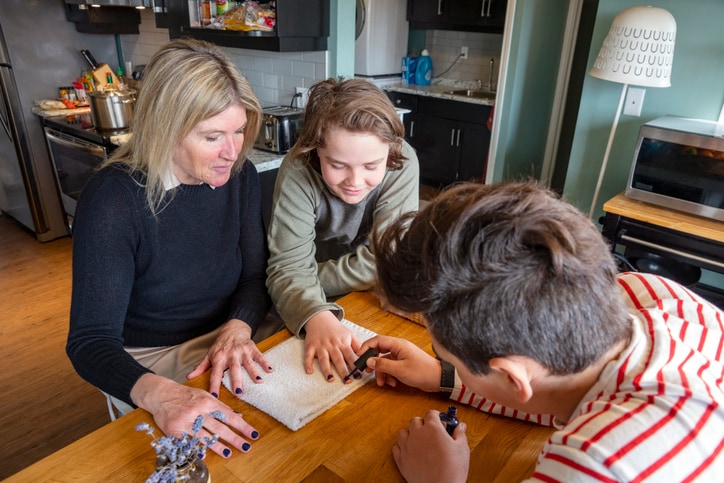You expect your teenager to get an occasional pimple on his face, but what happens when spots start popping up on your baby’s rosy cheeks? No worries, Mom. Acne in infancy is a completely different animal than the pimples and blackheads he’ll deal with later on. So, what’s the deal with those pimples on your baby’s face?
What Is Baby Acne?
Acne can happen to babies who are breastfed as well as babies who are formula-fed. “Baby acne is thought to be caused by the withdrawal of hormones from the mother’s pregnancy and possibly by the hormones in a mother’s breast milk,” says Dr. Dyan Hes, the founder and medical director at Gramercy Pediatrics and a “New York Magazine” best doctor. Dr. Ashanti Woods, an attending pediatrician Mercy Medical Center, explains it further, calling baby acne “an inflammatory reaction of the baby’s skin due to intrauterine or postnatal exposure to his or her mother’s hormones.” He continues to explain that a baby’s face being exposed to topical oils could also play a role in baby acne. Dr. Hes says, “However, formula-fed babies can also get infantile acne. Acne is the glands in the skin producing sebum.” Inflammation from too much oil, hormones or formula, bring the same result: a sweet baby face that’s not quite, well, baby smooth.
There are actually two types of baby acne — neonatal and milia. “Neonatal acne is best described as little red bumps or pustules affecting the forehead (most common), cheeks (second most common) or nose,” says Dr. Woods. Milia is characterized by numerous white bumps on a baby’s nose, he adds.
How Do You Prevent and Treat It?
It’s not easy to see your baby’s face covered in a rash, but the best plan of action is to wait it out. “There is no treatment for it,” says Dr. Hes. “It passes with time, usually by four months.” According the American Academy of Pediatrics, wash your baby’s face with water and a mild soap and never try to scrub or pop the acne, which can lead to scarring. To help prevent new bumps from popping up during this time, avoid using lotions on your little one’s face.
“There is not much a parent can do to minimize acne,” says Dr. Woods. “However, once acne is identified, we recommend limiting oil contact on that specific area.” Neonatal acne is self-limited, which means it goes away all by itself, says Dr. Woods. “Medication is rarely needed, specifically in cases of severe acne when the infant’s entire face is bright red,” he says. “Milia is another self-limited condition requiring no treatment,” says Dr. Woods.
When Should Your Baby See the Pediatrician?
While baby acne is benign and usually does not require medical care, there are times when you should seek help or a consultation. “When a majority of the baby’s face looks bright red or the baby is uncomfortable with any contact to the face, the pediatrician should be consulted,” suggests Dr. Woods.
Remember, your baby is beautiful — acne and all.
Want to learn more about what to expect from your baby? Check out 15 Things I Wish I’d Known About Newborns.
Laurie Bain Wilson writes frequently about parenting issues. She has been widely published in publications and websites including Working Mother, Sesame Street Parents, Parents, Parenting, salon.com, the Boston Globe and more.






